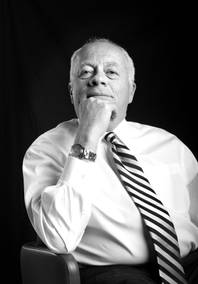Monday, Nov. 7, 2011 | 3 a.m.

Bruce Spotleson
VEGAS INC Coverage
Their industry has certainly been racked the past few years — along with the rest of the world — so banking execs might be excused if they want to avoid microphones for a while. But when they speak in public, they still tend to be quotable, and so I showed up with my reporter’s notebook in hand for the Asian Chamber of Commerce meeting Oct. 27.
The guest speaker was a banker, and a highly successful one at that: Russell Goldsmith, chairman and CEO of City National Bank, a financial institution with more than $23 billion in assets and a presence here, as well as in California, New York City and Nashville.
Talk about credentials. Goldsmith, a Harvard Law School grad, has a career’s worth of participation on high-powered financial advisory councils, coalitions and committees. Along the way, he headed Republic Pictures Corp., served as COO of Lorimar Inc., and was vice chairman of the San Diego Padres. In 2002, Forbes named him one of the 10 best CEOs in the country.
A board member of Wynn Resorts who knows our community from both business and close family perspectives, he’s tracked our economic peaks and valleys, along with whatever we call the present.
“The Great Recession clearly was not just ‘another’ recession, and that has been especially true here in Las Vegas,” he said at the Gold Coast luncheon. “The recession hit this region three times as hard as it did the rest of the economy.”
Many woes both locally and nationally were a direct result of the construction slowdown, he said.
“Historically, construction spending has led the U.S. out of every recession since World War II. That didn’t happen this time.”
Foreclosed and unsold homes may yet impede the recovery of the construction industry, but Goldsmith suggested that a housing recovery may be near, and that office space demand here is stabilizing after three years of declines.
He outlined the problems. Then, as any good leader should, he pointed to solutions. He suggested the federal government step in to provide a little more assistance — but not for his banking industry. He feels the conditions are right to make a big impact in other places and ways.
Assessing the nation’s current low interest rates, high unemployment and so-so GDP growth rates, Goldsmith contended the time is right for the federal government to borrow long-term, low-cost dollars — but only if the money would be spent domestically on infrastructure improvements and education rather than on tax breaks.
He pointed to Hoover Dam and interstate highways as examples of federal projects that helped establish Las Vegas, and said the timing was right for more such big thinking. He called for investments by governments “at every level” and for a concerted move to rebuild the infrastructure in our nation. He’s convinced the approach will accelerate the economic recovery.
“But that won’t happen unless the people in this state and in this nation tell their congressmen and senators that this is what they need to do,” he said.
He said elected officials may need to be reminded that all regional growth is closely linked to infrastructure like airports and transportation hubs. And then there’s the subject of education — something that just keeps coming up locally.
In 1950, Goldsmith pointed out, 60 percent of all jobs were “unskilled” and required only a high school diploma. Today, 80 percent of all jobs require much more education.
“In 2010, only 28 percent of Nevadans between the ages of 25 and 34 had an associate degree or higher,” he said. “By 2018, 54 percent of the jobs here in Nevada will require a college degree. How many of the unemployed will have that prerequisite to a job?”
Already, he said, the unemployment rate is 10 points lower for college grads than for those without postsecondary degrees.
He observed that most economists have urged smart stimulus spending on things that citizens expect their government to protect: Infrastructure, education and public safety.
Goldsmith had done some deep thinking on plenty of other issues, such as Asia, the deficit, federal spending and the tax system. He favors the “universal settlement” concept for the housing crisis, which forces all parties to share some of the pain but allows people to stay in their homes if they’re making mortgage payments.
He sees one obstacle to the not-so-radical solutions he and others have advanced. They require elected leaders to “come together and do what’s right for the country, not their political party.”
Goldsmith mades so much sense that I share it with our elected officials. Hope they’re reading.

Join the Discussion:
Check this out for a full explanation of our conversion to the LiveFyre commenting system and instructions on how to sign up for an account.
Full comments policy